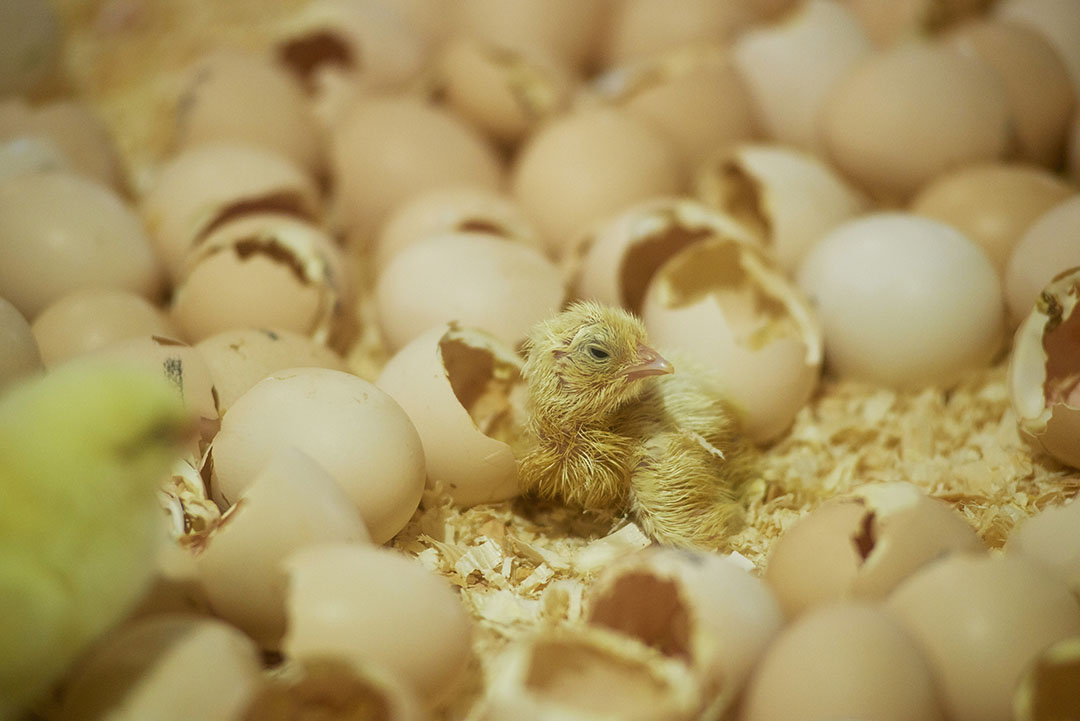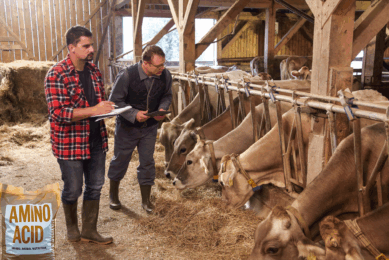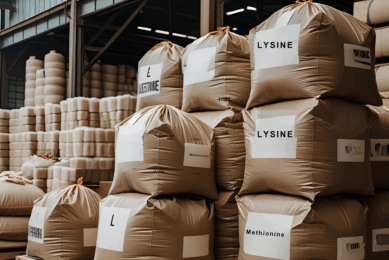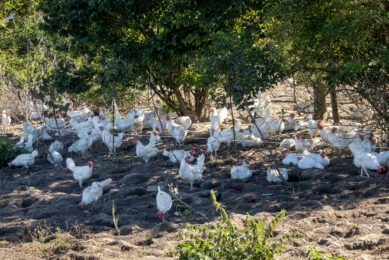Heat stress in poultry: In-ovo leucine can help Cover story

Heat stress poses an increasing threat for poultry production. By adding certain amino acids in-ovo, it was hypothesised that it could help in thermoregulation of the chicks after hatching.
Heat stress is currently considered to be a major environmental factor impairing the welfare and productivity of food producing animals. It not only affects the livestock industry in tropical climates, it can also be a problem in temperate regions. The damaging effects of heat stress on broilers and laying hens for example are reduced growth rates, decreased egg production and poor meat and egg quality. Heat stress presents an increasing challenge for poultry production across the world since chickens are very sensitive to high ambient temperature (HT). HT causes their body temperature to increase and induces oxidative stress. Promoting the development of thermotolerance in chickens is therefore key. Some free amino acids are recognised as biomarkers of heat stress, since they are significantly affected by heat stress. These free amino acids play critical roles in thermoregulation, as well as in reducing body temperature in chicks under heat stress.
Role of leucine
Leucine (Leu) is considered an essential amino acid (AA) necessary for maintenance and growth of tissues. Leu has been demonstrated to play critical roles in physiological regulation, including in protein synthesis, in reducing muscle damage, and in glucose or lipid metabolic activity. L-leucine (L-leu), also known as 2-amino-4-methylvaleric acid, belongs to leucine and derivatives class of compounds. Earlier studies have looked at the effect of in-ovo administration of leucine on thermal manipulation (TM), a technique enabling the acquisition of thermotolerance in chickens.
Check out the interactive Poultry Health Tool – with the latest insights on the 40+ most common poultry diseases.
It was found that in-ovo administration of L-leu (35 μmol/egg) on embryonic 60 day (ED) caused hypothermia at hatching, and also provided thermotolerance in young broiler male chicks under HT. However, the appropriate dose at which to administer L-leu in-ovo to develop thermoregulatory functions in broiler chicks is still unknown. New research, as further discussed here, therefore aimed to compare the effects on body temperature and body weight of 2 doses (35 or 70 μmol/egg) of L-leu administered in-ovo, as well as their effects on thyroid hormone levels at hatching in broiler chicks. The latter is included because the thyroid hormones thyroxine and triiodothyronine (T3) are associated with metabolic rate, which affects the regulation of body temperature. The second aim of this study was to investigate the effect of in-ovo administration of a high dose (70 μmol/egg) of l-Leu on daily body temperature and body weight, as well as on feed intake, plasma metabolites and thermotolerance in chicks under heat stress.

L-leu solution injected in egg
The first experiment consisted of 45 fertilised broiler eggs, divided into 3 groups (n = 15/group) based on the initial egg weight, with the resulting groups being as uniform possible.
The groups were as follows:
- control (sterile water injection in the amount of 500 µl/egg)
- L-leu low dose (35 µmol/500 µl/egg)
- L-leu high dose (70 µmol/500 µl/egg)
After sterilisation, a small hole was made at the large end of the egg and sterile water or L-leu solution was injected to a depth of 25 mm with a 1-ml disposable syringe that had a 25-gauge needle. At ED 18, the eggs were shifted to the hatching trays after detecting the undeveloped and dead embryos by candling and removing them. Rectal temperature (RT) and body weight were recorded at 2 hours after hatching. In the second experiment, 54 eggs were divided into 2 groups based on their initial weight.
The experimental groups were:
- control (n = 27; average egg weight = 64.1 g)
- L-leu high dose (n = 27; average egg weight = 63.9 g)
The incubation and in-ovo administration processes were the same as described above in experiment one. After hatching, the chicks were housed in groups in metal cages under a control thermoneutral temperature (CT) with the following temperature schedule: 30°C for 1-4 days, and 28°C for 5-10 days. In previous studies, in-ovo administration of L-leu was found to afford thermotolerance in young male broiler chicks. At 2 days old, therefore, the males were separated, by means of sexing through feather identification, for further experimental procedures to be carried out on them.
Conclusion
Body temperature is a reliable parameter of thermotolerance acquisition in avians. In the current study, the researchers administered 2 doses (35 and 70 μmol/egg) of L-leu in-ovo and examined their effects on rectal temperature, body weight and thyroid hormone levels at hatching in experiment one. According to the researchers, this is the first report to show that daily body temperature is higher in post-hatched chicks as a result of the in-ovo administration of the amino acid L-leu. Body temperature was significantly lowered in chicks administered with L-leu in-ovo compared with control chicks under heat exposure, which suggests that in-ovo administration of L-leu improved the thermotolerance of chicks. Feed intake and plasma metabolites (NEFA, ketone bodies) were not affected at 120 min of heat exposure, which indicate that feed intake and lipid metabolism might not be the main contributors to L-leu-mediated improvement in thermotolerance. This recent study also supports the finding that thermotolerance was improved without affecting feed intake and lipid metabolism after 120 min of heat stress in four-week-old broilers administered with L-leu in-ovo (unpublished data). Therefore, it could be speculated that in-ovo administration of L-leu might cause some epigenetic modulations in certain neural factors in broiler chicks to afford thermotolerance since the brain is the centre of thermoregulation. Future research will aim to clarify this issue. In conclusion, the stronger effects of high-dose in-ovo administration of L-leu caused hypothermia and a reduced plasma T4 level at hatching, as well as enhancing the daily thermoregulation process in neonatal chicks and affording thermotolerance. The present study clarified that feed-intake regulation and lipid metabolism did not contribute to the L-leu-mediated improvement in thermotolerance under short-term heat stress. A future study will reveal the biochemical and molecular mechanisms whereby L-leu improves thermotolerance.
This article is a summary of the original paper: L-Leucine increases the daily body temperature and affords thermotolerance in broiler chicks, published in the Asian-Australasian Journal of Animal Sciences, October, 2018.











